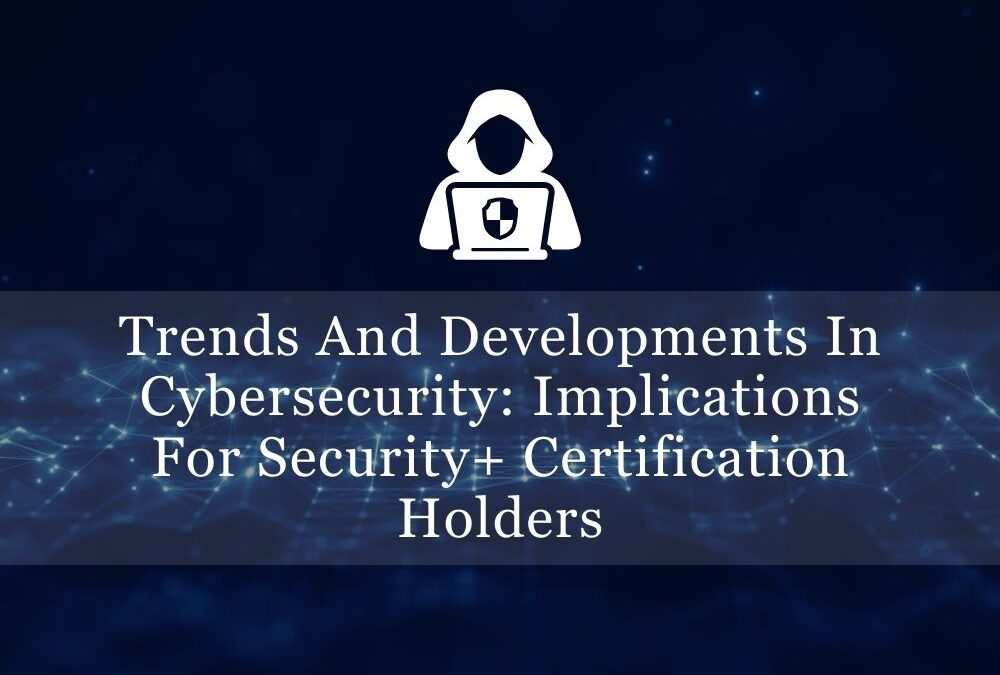In today’s interconnected digital world, cybersecurity has become paramount. As technology evolves, so do the methods used by cybercriminals to breach networks, steal data, and disrupt operations. For professionals holding the Security+ certification, staying abreast of the latest trends and developments in cybersecurity is not just advisable but essential to maintaining the integrity of systems and protecting sensitive information. In this blog post, we’ll explore some of the prominent trends and developments in cybersecurity and discuss their implications for Security+ certification holders.
- Rise of Artificial Intelligence and Machine Learning in Cybersecurity: AI and machine learning have emerged as powerful tools in the fight against cyber threats. These technologies can analyze vast amounts of data, identify patterns, and detect anomalies that may indicate a potential security breach. Security+ certification holders need to familiarize themselves with AI and machine learning algorithms used in cybersecurity tools and understand how these technologies can enhance threat detection and response capabilities.
- Shift towards Zero Trust Architecture: Traditional perimeter-based security models are no longer sufficient in today’s dynamic threat landscape. Zero Trust Architecture (ZTA) assumes that threats may already exist within the network and requires strict identity verification and access controls for every user and device attempting to connect to the network. Security+ professionals should be well-versed in ZTA principles and implementation strategies to strengthen network security and mitigate insider threats.
- Growing Importance of Cloud Security: With the widespread adoption of cloud computing, protecting data stored in the cloud has become a top priority for organizations. Security+ certification holders must understand the unique security challenges posed by cloud environments, such as shared responsibility models, data encryption, and secure configuration management. Additionally, familiarity with cloud security frameworks like the Cloud Security Alliance’s (CSA) Cloud Controls Matrix is essential for ensuring robust cloud security posture.
- Ransomware and Cyber Extortion Attacks: Ransomware attacks continue to plague organizations of all sizes, causing significant financial losses and reputational damage. Cybercriminals are increasingly targeting critical infrastructure, healthcare facilities, and government agencies with ransomware and cyber extortion schemes. Security+ professionals need to stay updated on the latest ransomware variants and mitigation strategies, including regular data backups, network segmentation, and employee training on phishing awareness.
- Focus on IoT Security: The proliferation of Internet of Things (IoT) devices presents new cybersecurity challenges, as these devices often lack robust security features and are vulnerable to exploitation. Security+ certification holders should understand the security risks associated with IoT devices, such as default credentials, insecure firmware updates, and lack of encryption. Implementing IoT security best practices, such as device authentication and encryption, is crucial for protecting IoT ecosystems from cyber threats.
- Regulatory Compliance and Data Privacy: Data privacy regulations, such as the General Data Protection Regulation (GDPR) and the California Consumer Privacy Act (CCPA), impose stringent requirements on organizations regarding the collection, storage, and processing of personal data. Security+ professionals must have a thorough understanding of regulatory compliance frameworks and help organizations implement appropriate security controls to safeguard sensitive information and ensure compliance with applicable laws.
- Cybersecurity Skills Shortage: The cybersecurity industry faces a significant shortage of skilled professionals, creating challenges for organizations seeking to recruit and retain qualified talent. Security+ certification holders are in high demand, as they possess the foundational knowledge and skills needed to secure IT infrastructures and defend against cyber threats. Continuing education and professional development are essential for Security+ professionals to stay relevant and advance their careers in the rapidly evolving field of cybersecurity.

